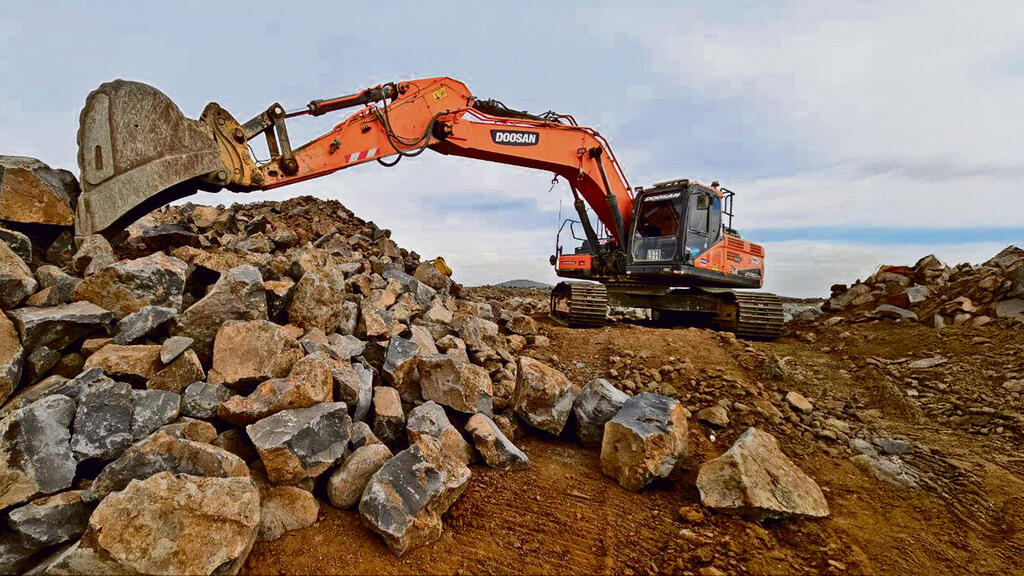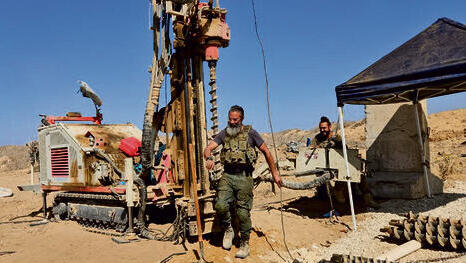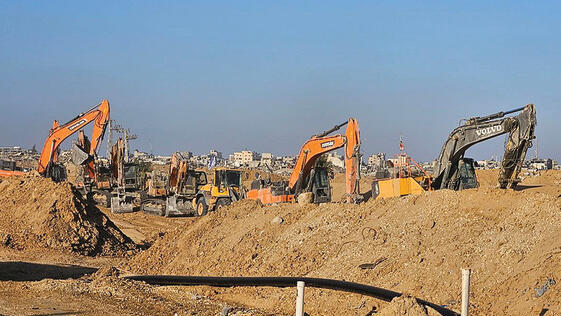Getting your Trinity Audio player ready...
"Combat engineering, combat engineering and more combat engineering of all kinds. If we could double the Combat Engineering Corps, not just Yahalom, we’d have done it by now," a senior IDF officer told Ynet, highlighting the growing demand for engineering capabilities amid prolonged fighting across multiple arenas.
To address these challenges, the IDF plans to establish an additional regular combat engineering battalion in the coming months, adding to the existing three. However, this move is only a partial solution. Ynet has learned that, in recent months, the IDF has increasingly relied on civilian contractors for operational missions in combat zones, under the command of IDF officers. Initially limited in scope, this practice has grown significantly.
Civilian contractors, using large orange bulldozers, have been deployed to level hundreds of buildings in the Netzarim Corridor in northern Gaza, drill for Hamas tunnels in areas like the Philadelphi Corridor in southern Gaza and clear space for safer IDF operations. The Philadelphi Corridor itself has been expanded to a width of 3-4 kilometers, providing a buffer for IDF forces.
This trend has extended beyond Gaza. In Lebanon, contractors have crossed the border to clear vast thickets where Hezbollah has hidden military infrastructure, including observation posts, underground firing ranges and bunkers.
Since the collapse of the Assad regime, contractors in bright yellow vests have also been active along the Syrian border, working on five major sites. Their tasks include blasting basalt cliffs, digging deep trenches and building embankments to secure the border with a disintegrating Syria teeming with armed militias
While the IDF has historically employed civilian contractors for border fortifications during peacetime, their current use in active combat zones and beyond Israeli territory marks a significant shift, reflecting the demands of ongoing multi-front operations.
The urgent needs of the IDF
"Hundreds of IDF bulldozers and tractors were worn out during the operation in the Gaza Strip, including D9 bulldozers, so the need arose to lease or mobilize equipment from civilians. Later, we realized that we would also need operators and contractors due to the enormous number of engineering missions, and not just in the Gaza arena," according to the IDF.
"The use of civilian contractors creates flexibility: The heavy mechanical equipment companies in the engineering battalions operate in the most advanced and dangerous missions on the attack lines, for example now in Jabaliya or alongside tanks on the most advanced lines of the operation in the Syrian Golan, and behind them, in 'safer' missions, the contractors are deployed after we take operational control of the area. Hundreds of our engineering soldiers were injured and killed throughout the long fighting, this is not an infinite resource. That is why we turned to civilian contractors through regular procedures carried out by the Defense Ministry."
'We are briefed by the officers before each work day and are warned about how to behave in the event of an operational incident. It is clear that this is dangerous work'
Compounding the IDF's shortage of engineering personnel is the delay of a shipment of 132 D9 bulldozers ordered from the U.S. months ago. The delivery has been stalled due to a silent embargo by the U.S. State Department, as reported by Ynet and its sister publication Yedioth Ahronoth last month.
'Workday' in the Gaza Strip
This is how the method works: The IDF defines a specific, time-bound task, for example, the demolition of 20 buildings in a Gaza neighborhood in which the forces have finished fighting; a request is issued for a civilian contractor who shows up with his workers and large equipment to operate in daylight, under the protection of soldiers and the supervision of IDF engineering units. In the evening, the civilian workers leave the area, and return the next day to continue the work.
"We are looking for operators of excavators and bulldozers and we don't stop on Saturdays, and it's usually for two months, five days a week, from 6 a.m. to 6 p.m. Sometimes we also destroy terrorist infrastructure for the army that they take out, such as lathes, factories, etc.," one of the labor managers described to Ynet, noting several types of payment.
"A private individual who has an excavator and brings it with him receives the highest payment, it's the best money; an operator under a company is paid hourly, also respectably, well above minimum wage; and someone who served in the IDF and wants to do so as a reservist enjoys all the grants and benefits for reserve personnel."
'It's obviously a dangerous job'
Some civilian engineering missions in Gaza have reached the front lines, with battalion commanders deploying teams to demolish buildings used to fire on IDF forces. In several recent cases, contractors were spotted working without protective gear such as helmets, overalls or uniforms.
One of them described that "even if they ask us to protect ourselves, it is not comfortable to drill or dig under the sun for hours with a helmet on. We are briefed by the officers before each workday and are warned about how to behave in the event of an operational incident. It is clear that this is dangerous work."
Forces from the 210th Division's 474th Brigade on the Golan front
(Video: IDF Spokesperson's Unit)
Get the Ynetnews app on your smartphone: Google Play: https://bit.ly/4eJ37pE | Apple App Store: https://bit.ly/3ZL7iNv
last May, Liron Yitzhak, a 30-year-old contractor from Kfar Saba, was killed by mortar fire in the Gaza Strip. His family continues to fight for his recognition as an IDF casualty. Their struggle gained renewed attention after the IDF recently recognized historian Ze’ev “Jabo” Erlich as a casualty, despite his status as a civilian accompanying Golani Brigade forces in Lebanon, where he was killed in a clash with Hezbollah terrorists.
Addressing the growing use of civilian contractors in combat zones, the IDF said: “The contractors understand the risks and sign off on them. We provide them with protection, but this isn’t construction work in Netanya. They only operate during the day, as they aren’t trained to work with IDF commandos at night. They give us breathing space and bring engineering expertise, like drilling, that is nearly nonexistent in the IDF.”








